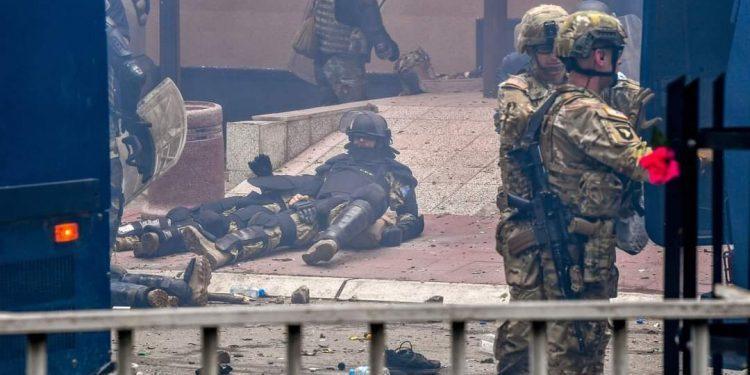Tensions escalated in north Kosovo as police and Nato peacekeeping troops clashed with Serb demonstrators, highlighting the ongoing unrest surrounding the appointment of ethnic Albanian mayors. In the town of Zvecan, tear gas and stun grenades were employed to disperse protesters who attempted to breach a local government building. Nato soldiers formed a security cordon around two other town halls to maintain order.
While there have been no reported fatalities, some individuals sustained injuries during the clashes. The crisis traces back to April when Kosovo Serbs boycotted local elections, resulting in ethnic Albanians gaining control of local councils with a turnout of less than four percent. The latest violence on Monday left eleven Nato soldiers from Italy injured, three of whom are in a serious condition.
Initially, Nato-led peacekeepers in Zvecan aimed to separate the protesters from the police. However, they later resorted to using shields and batons to disperse the crowd, as some demonstrators threw rocks and Molotov cocktails at the soldiers. Nato denounced the attacks as “totally unacceptable” and urged all parties to refrain from actions that would further fuel tensions, emphasizing the importance of dialogue.
In response to the fresh protests, Serbian President Aleksander Vucic elevated the army to the highest level of combat readiness and positioned army units near Kosovo’s border. This move followed similar clashes earlier. The deputy head of the Serb List, the largest Kosovo Serb party supported by the Serbian government, accused President Vucic of attempting to create chaos for everyone in Kosovo. He criticized the appointment of “fake mayors” who allegedly received only 50 votes, asserting that even Albanians did not support them.
The recent disorder stems from the boycott of local elections by Kosovo Serbs, who constitute approximately 5% of the country’s population. This boycott resulted in ethnic Albanians gaining control of the councils in four northern municipalities with a majority Serb population. Belgrade supported the boycott, which led to a meager turnout of just 3.47%. The boycott was sparked by the Serb community’s demand for the establishment of a promised association of Serbian municipalities.
Kosovo unilaterally declared independence from Serbia in 2008 after years of strained relations between its Serb and Albanian inhabitants. While the United States and major European Union countries have recognized Kosovo’s independence, Serbia, with support from Russia, refuses to do so. The majority of ethnic Serbs within Kosovo also reject the declaration.
Despite supporting Kosovo’s independence, the US criticized the installation of Albanian officials, stating that it had needlessly escalated tensions in the region and undermined efforts to normalize relations between Kosovo and Serbia. The situation in Kosovo remains volatile, attracting international attention and raising concerns about stability in the region.

